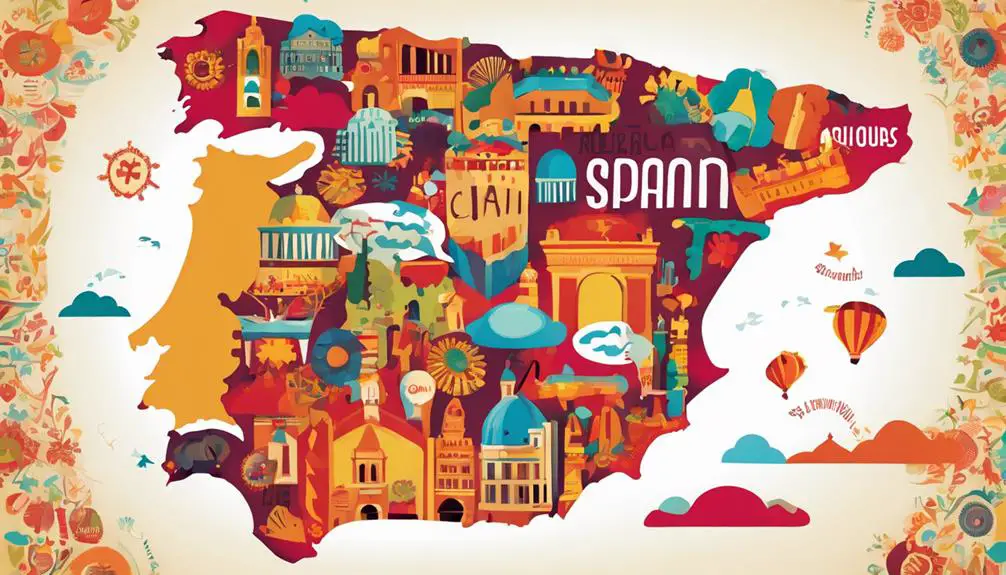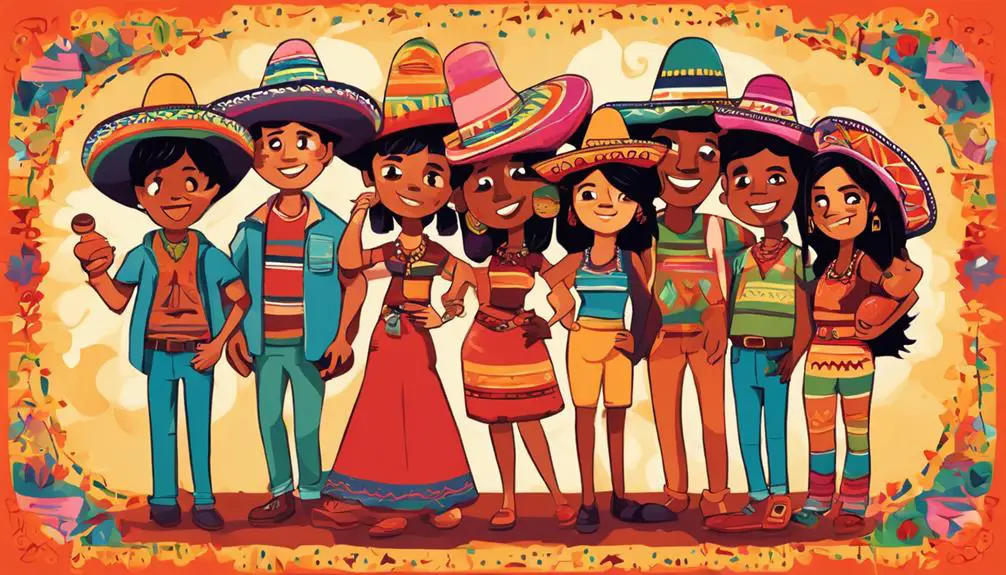As you explore Spanish slang, you'll encounter affectionate terms like "mi amor" and "cariño" that convey emotional closeness. You'll also discover playful insults and teasing, known as "pullas" or "guasas," that foster camaraderie. Each region, from Mexico to Spain, has its unique slang expressions that reflect local cultural differences. Nicknames and affectionate labels, like "m'ija" and "papá," shape personal relationships, while slang names for friends and peers, like "compa" and "pana," create a sense of belonging. As you navigate these nuances, you'll uncover a rich cultural landscape that's full of surprises.
Slang Terms of Endearment

When interacting with native Spanish speakers, you'll frequently encounter affectionate slang terms that add a touch of warmth and intimacy to conversations. These terms of affection hold significant cultural significance, conveying emotional closeness and fondness.
In Spanish culture, using affectionate language is a way to establish and maintain social bonds. You'll often hear terms like 'mi amor' (my love), 'corazón' (heart), or 'cariño' (darling) used to address friends, family, or even strangers. These terms aren't only reserved for romantic relationships but are also used to express platonic affection.
Using these terms of endearment can help you build stronger relationships with native speakers and demonstrate your cultural sensitivity. For instance, addressing a friend as 'mi corazón' can convey a sense of camaraderie and mutual respect. Similarly, using 'mi vida' (my life) to address a loved one can express deep affection and appreciation.
Playful Insults and Teasing
In informal Spanish-speaking settings, you'll often encounter playful insults and teasing, known as 'pullas' or 'guasas,' which are an integral part of the cultural fabric, serving as a way to build camaraderie and strengthen social bonds. These lighthearted jabs and witty remarks are exchanged among friends and acquaintances, creating a sense of camaraderie and shared humor.
| Teasing Style | Description | Example |
|---|---|---|
| Banter battles | Quick-witted exchanges of playful insults | "You're so lazy, you make a sloth look like a marathon runner!" |
| Roast sessions | Good-natured teasing, often involving humorous criticism | "Your dancing is so bad, you should be arrested for disturbing the peace!" |
| Playful jabs | Lighthearted, playful teasing, often involving wordplay | "You're so short, you need a stool to reach the kitchen counter!" |
| Sarcasm | Ironic or mocking comments, often used to poke fun at oneself or others | "Wow, you're so smart, you can barely tie your shoes!" |
| Jocular mocking | Humorous, exaggerated criticism, often used to build camaraderie | "You're so bad at soccer, you'd get beat by a team of grandmas!" |
Regional Slang Expressions

Across the diverse regions of the Spanish-speaking world, you'll encounter a rich tapestry of slang expressions that are uniquely woven into the local cultural fabric. As you explore further into the world of Spanish slang, you'll discover that dialect differences and regional nuances play a significant role in shaping the language.
From the Caribbean coast of Colombia to the Andean highlands of Peru, each region boasts its distinct flavor of slang. In Mexico, you'll hear phrases like ' Güey' (dude) and 'Chido' (cool), while in Argentina, 'Che' (buddy) and 'Boludo' (dude) are staples of everyday conversation. In Spain, 'Tío' (dude) and 'Guay' (cool) are common expressions.
These regional variations aren't just limited to vocabulary; they also reflect differences in tone, rhythm, and even body language. Understanding these regional nuances is essential to mastering the art of Spanish slang. By acknowledging and embracing these differences, you'll be better equipped to navigate the complex landscape of Spanish slang and connect with native speakers on a deeper level.
Nicknames and Affectionate Labels
As you explore the complex landscape of Spanish slang, you'll find that nicknames and affectionate labels play a significant role in shaping personal relationships and social dynamics. These terms, often used to address friends, family, and loved ones, hold a special place in Spanish-speaking cultures. They convey affection, intimacy, and closeness, and are an integral part of daily communication.
Nicknames like 'm'ija' (a shortened form of 'mi hija,' or 'my daughter') or 'papá' (a term of endearment for an older man) carry cultural significance, reflecting the importance of family and social bonds.
Moreover, these labels can reveal aspects of personal identity, such as regional origin, socioeconomic status, or personal characteristics. For instance, someone from Andalusia might be affectionately called 'andaluz' or 'sevillano,' highlighting their regional roots. By using these nicknames, individuals can express their cultural heritage and personal identity, fostering a sense of belonging and community.
In Spanish-speaking cultures, nicknames and affectionate labels serve as a social glue, strengthening relationships and reinforcing social bonds.
Slang Names for Friends and Peers

You'll often find that your Spanish-speaking friends and peers are referred to by affectionate slang names, such as 'compa' or 'pana,' which convey a sense of camaraderie and shared experiences. These informal labels create a sense of belonging and closeness, distinguishing casual relationships from formal ones.
In a formal setting, you might address your peers with titles like 'señor' or 'señora,' but in casual conversations, you'll often hear 'cuate' or 'primo' used to address friends.
The way you address someone online also differs from in-person interactions. Online identities often blur the lines between formal and casual communication. You might use formal language in a professional online setting, but switch to casual slang with friends on social media.
Understanding the nuances of slang names for friends and peers can help you navigate these diverse contexts. By recognizing the differences between formal and casual language, you can tailor your communication style to the situation, fostering stronger relationships and avoiding misunderstandings.
Frequently Asked Questions
Is It Appropriate to Use Spanish Slang With People I Don't Know Well?
When interacting with people you don't know well, it's crucial to respect social boundaries and cultural norms. Using slang with acquaintances can come across as overly familiar or even presumptuous.
You should gauge the other person's comfort with informal language before using it. Avoid using slang as a way to forcedly establish a connection; instead, focus on building rapport through respectful and considerate communication.
How Do I Know if Someone Is Using Slang to Mock Me or Be Friendly?
You're traversing a linguistic minefield, where a misstep can be as delicate as a feather triggering a landslide. When unsure if someone's using slang to mock or befriend you, pay attention to tone detection.
Do they use slang with others or only with you? Observe their body language and tone of voice. Are they leaning in or crossing their arms? Slang intentions can be ambiguous, but context is key.
Analyze the situation, and trust your instincts to decipher their motives.
Are There Any Cultural or Regional Nuances to Using Spanish Slang?
As you navigate Spanish conversations, you'll encounter dialect variations that reflect regional identities. You might notice that certain slang terms are more prevalent in specific areas, like Argentina's Lunfardo or Spain's Andean dialect.
Be aware that some expressions may carry different connotations depending on the region. For instance, a term might be playful in one area but offensive in another.
Understanding these cultural nuances will help you use Spanish slang effectively and avoid unintentionally offending someone.
Can I Use Spanish Slang in Formal Writing or Professional Settings?
When writing in formal settings, you should maintain a professional tone that aligns with your identity.
In general, it's best to avoid using slang in formal writing, as it may come across as informal or unprofessional.
Instead, opt for standard Spanish vocabulary that conveys your message clearly and respectfully.
This will help you project a polished, professional image that resonates with your audience.
Is It Impolite to Use Spanish Slang With Someone Much Older or Younger?
When interacting with someone markedly older or younger, you should be mindful of age dynamics. Using informal language, including slang, can blur respect boundaries. While you may intend to be relatable, it's crucial to prioritize respect and professionalism, especially with authority figures or those who may not be familiar with colloquialisms.
Be cautious not to come across as disrespectful or immature. Instead, opt for clear, respectful communication that acknowledges the age difference.
Conclusion
Mastering the nuances of Spanish slang is a badge of honor for any language enthusiast.
You've now got a handle on the affectionate terms that'll make you a valued amigo, the playful jabs that'll solidify your status as a witty compadre, and the regional expressions that'll make you sound like a native.
As you navigate the complexities of Spanish slang, remember that it's not just about the words – it's about the cultural context and emotional depth they convey.







